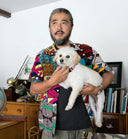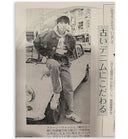Complimentary Shipping


AERANAUT 02: Yuki Matsuda
Designer and Tastemaker
You’d be hard pressed these days to find a corner of the globe where American style at its most casual hasn’t yet penetrated. The daily uniform of just about everyone on the planet – from jeans to t-shirts to sneakers - is fashion’s lingua franca. It was not always so. For fashion designer and vintage-hound, Yuki Matsuda, Americana was a startling discovery and one that defined the path of his life. At just 18, Osaka-born Matsuda boarded an aeroplane to Los Angeles and never looked back.
In the late 1980s, the Japanese craze for vintage Levi’s was just getting started. Matsuda fed the craze, scouring the thrift stores of LA for vintage American-made clothing at 50 cents a time, shipping it back to an appreciative audience at home. Eventually, the obsession for Levi’s came full circle back to America (even reviving the fortunes of Levi’s itself in the process). More significantly, this Japanese trend kick-started vintage Americana as a major force in world fashion that was parallel to fashion but somehow different.
Rooted in a quest for authenticity and permanence, it is particularly relevant now, when the reusing or repurposing of clothes with a back story has taken on added meaning. But it all started with a handful of vintage hounds like Matsuda. At 53, Yuki, who runs a number of clothing brands out of the South LA suburb of Redondo Beach – including shoemaker Yuketen – is a well-known character in the men’s fashion business, a recognizable face at trade shows across Europe and the USA. We spoke with Yuki about his passions.
Yuki when did you first develop an interest in clothing?
I think when I was about 14 years old, I started noticing the differences between clothes from the USA and Japanese-made product. The best was Levi's 501 jeans. The first time I wore them I think I was 15 years old. It was a shocking thing to me the first time I wore 501’s because, at the time in Japan, no one wore button fly pants, everybody wore pants with zippers. The jeans were also very rigid when new – unlike anything we had in Japan. You first had to wear them in the bath to get them to fit right.
So, you were hooked at a young age. And that led to a great opportunity…
After I finished high school in Osaka, when I was 18, my girlfriend at the time was working for a company importing clothes from America. They were looking for a younger guy who understood the Japanese fashion market to work for them in Los Angeles. It was a chance to go to America for free.




That trip must have been daunting to an 18-year-old from Osaka.
When I got to the airport in Los Angeles I was scared. I’d never seen so many really tall people! I had grown up in Japan, where you just didn’t see black or white people around you. I thought, okay, maybe I stay two weeks, maybe then I go home.
Instead, you stayed six months. What was that experience like?
It was a very interesting way to learn about the fashion business. I went to trade shows and I got to pick out the styles to buy. It was really training, a beginning in understanding fashion as a business. I stayed there six months, then I went back to Japan. But after two weeks, I was back in LA.
What drew you back to Los Angeles?
So, I thought maybe I can find work as a dishwasher or maybe work in a bar because there was a large Japanese community in LA. I could survive without perfect English and meanwhile I figured I could learn more about vintage fashion on my own. Back then, in LA, there were amazing thrift stores. I found I could buy Levi’s 501’s for 50 cents a time or a vintage sweatshirt for 25 cents. Then there was the Rose Bowl Flea Market, where you could find all kinds of rare vintage clothes from many different eras.
With all that vintage on tap, what led you to starting a fashion brand?
I was buying a lot of vintage clothing, trying to find dead-stock clothing by very old American brands and then exporting it to Japan. I was buying a lot of clothes, some of it very old, some as old as the 1930s. But the trouble with vintage – especially the older stuff – it that it's impossible to find a perfect size. It’s too big or too small, many things have shrunk in the wash. So, I concluded that maybe it would be better to make clothes myself. So, I decided to research, and we thought maybe we can find good factories, and we started Meg Co to make our own replica American vintage clothes.
Why is it that the best new Americana seems to come from Japanese designers?
Well, I think it’s because Japanese people are very detail focused. They really notice the differences. I bought a pair of rare Levi's double XX’s from the 1940s when I was last in Japan. The store staff knew all about all the details, even the hidden rivets that Levi’s put inside the pockets at that time. I think Japanese don’t just wear clothes they really study them.




What prompted you to set up Yuketen?
I wanted to make traditional American shoes, but I needed to make them better and more fashionable. It’s like this: a normal Mercedes is pretty cool right? But if it gets an upgrade by AMG then it’s like wow!
So, your shoe designs come with quality as standard
I guess I’m trying to make shoes like they were made in the 1940's and ‘50s, with a sense of quality, from a time when people really cared how they made shoes. But I’m adding interesting new details. At Yuketen, we just do everything better than the normal. We use better quality leather and soles; we don’t use any cardboard inside the shoes like many American brands use now. Mainstream American brands also use pre-perforated leather We make our shoes by hand, the old-fashioned way with an awl and a needle, every stitch is punched and sewn by hand. We use natural rubber for the sole and instead of cardboard we put cork chips for a more vintage look and feel. They last longer. Because of the way they are built, if you wear out the sole and you sent them back to us, we can put new soles on.
What is the advantage of having your own shoe factory?
Well, it’s not a big factory, but it gives us the freedom to design and make excellent quality shoes.
What draws you to Italian food?
Italian food is about passion; it's not easy food. It seems simple but you really need to have great passion to make it. To make a good tomato sauce it can take 24 hours. And for Italian food all the ingredients have to be really good. You have to have very good tomatoes, very good salt, very good olive oil, very good beef. It's so important. That's kind of what we do at Yuketen I think. We do simple things with very good ingredients.
Is it important to stop the clock sometimes?
Sure. I try to stop, to look around me, to take time to think, to listen to my people. I have a big archive of clothes some of which I bought twenty or thirty years ago. If I want to design something, I need to consciously stop and take time to go through it myself.








